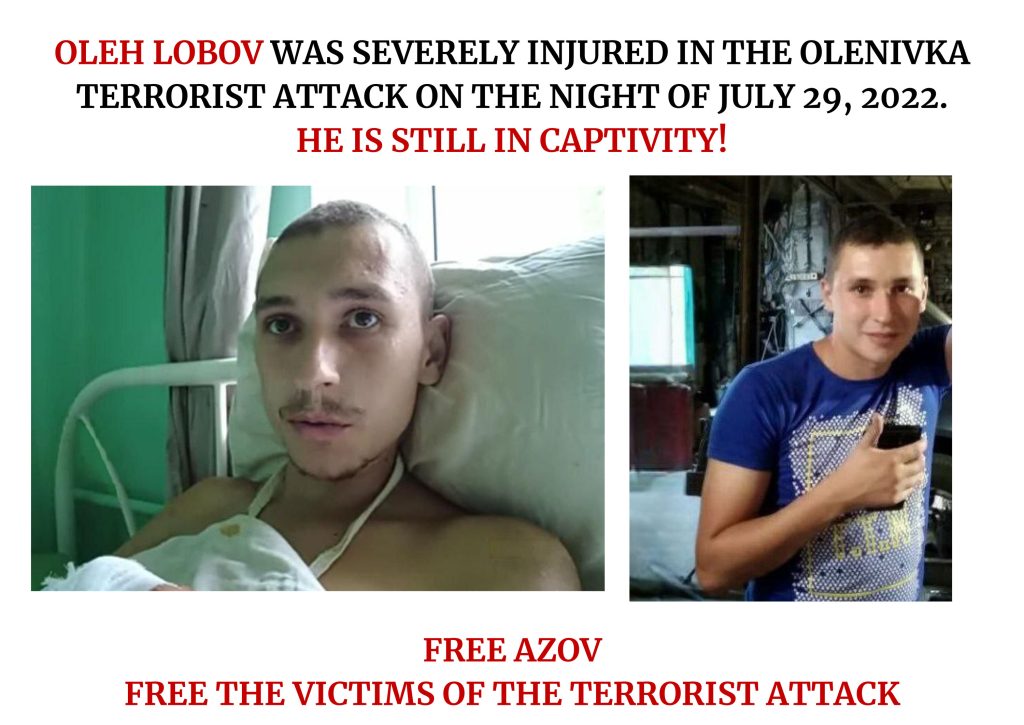There is still threat to their life and health
On the night of July 29, 2022, Russians committed a war crime in colony 120 in Olenivka. At least 50 prisoners of war who defended the city of Mariupol and surrendered to captivity from Azovstal on the orders of the command in May 2022 were killed. About 130 people were injured of varying severity. More than 2 years have passed since the attack in Olenivka, but most of the wounded are still in Russian prisons. Among them are Azov Brigade fighters who were seriously injured, Oleh Lobov and Artem Hondiul.

Anna and Oleh’s story
Anna Lobov’s daughter was one-month-old when her husband, 32 and another Azovstal defender, left for the frontline.
She recalled how on 31 July, just a few days after the Olenivka attack, her husband’s name, Oleh, appeared on both lists of those killed and those injured. “I didn’t really know what to make of it,” Ana, 29, now based in Zhytomyr, said.
The last time Anna spoke to her husband was on 16 May, the day of the surrender, when he sent her a personal text but didn’t give any information or promise he would return.
But on 17 August that year, she spotted Oleh in a Telegram video from a hospital in Donetsk.
“That’s how I found out he was alive,” she said. “That was the only time since the start of the full-scale war that I saw him.”
In the video, Oleh said he had shrapnel wounds all over his body and a wound to his hand, Anna said.
“You could see that he’s lost weight and if you looked into his eyes, you could see how tired he felt.”
Through a released prisoner who she spoke to in December that year, Anna was able to obtain some information about her husband, including that he had spent six months in hospital and had been put in isolation after catching a supposed cold.
Speaking of how her daughter would play with a family picture attached to a fridge magnet, Anna said she has now started avoiding talking about her father to her now-toddler girl, Mariia.
But she would probably still “recognise her daddy” if she found any pictures “in the wardrobe or somewhere where I keep them”.
Ana says that ensuring her daughter grows up with her dad “encourages me to continue fighting for the release of my husband and his friends and those people who turned out to be in captivity”.
She went on: “I believed that international organizations were going to visit the victims of the terrorist attack, get reliable lists, and that the seriously wounded would be taken from hospitals to a third country, but this did not happen either in a month or almost a year later.”

Anastasiia and Artem’s story
Anastasiia Hondiul, 47, hasn’t had any news of her husband Artem, 41, since she saw him on Russian TV in August after the Olenivka attack, in which he was reportedly injured.
She knows he had already been severely injured while at the Azovstal plant, with part of a mine believed to still be stuck in his pelvis.
She has now made it her priority to raise awareness of PoWs who, two years on, are still in foreign hands under practically unknown circumstances.

Anastasiia, who at one point started taking antidepressants to tackle the anxiety of her husband being on the frontline, has traveled to Geneva to address the UN and Red Cross, as well as Poland to speak at the Warsaw Human Dimension Conference, organized by the Organization for Security and Co-operation in Europe (OSCE).
She also traveled to Canada, where she visited her daughter and organized a peaceful protest in Montreal and Ottawa.
Anastasiia and Anna also met the papal ambassador to Ukraine, Archbishop Visvaldas Kulbokas, for support.
The struggle for their return continues
In July of this year, the Russians filmed propaganda interviews with prisoners of war, including Oleg and Artem. At the same time, for the first time in more than two years of captivity, they were allowed to call their wives. However, the conversations were short and information about their health and place of detention is unknown.

The NGO Olenivka Community, in which Anastasiia and Anna are active, is trying to speed up the exchange of severely wounded prisoners of war from the terrorist attack in Olenivka, as they may still be in danger. Russian captivity means death, torture, and uncertainty.

